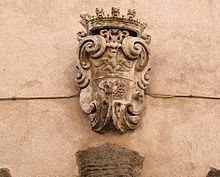Ruspoli (noble family)
Ruspoli is the name of an Italian noble family that has been recorded in Florence since the early 13th century .
After the family died out in the male line in the 17th century, the name passed to a member of the Marescotti family from ancient papal nobility , whose descendants still bear the title of Prince of Cerveteri, awarded in 1709, as well as other noble titles.
history
The Ruspoli

The origins of the Ruspoli family go back to Florence in the early 13th century, where tombs from this period have been preserved in the churches of Santa Maria Novella and Ognissanti . Family members held high offices such as gonfaloniere , praetors of the city fortifications, and priors . In the battles between the Guelfs and Ghibellines , they were among the latter. Lorenzo Ruspoli (* 1460) accompanied Amerigo Vespucci on his voyages of discovery.
Bartolomeo Ruspoli (* 1496) placed himself in the service of the Florentine banking family Altoviti, whom he represented in Rome from 1529. There he married Maria Ardinghelli, the niece of Cardinal Niccolò Ardinghelli , a close collaborator of the future Pope Paul III. from Farnese . Bartolomeo received important lay offices in the Curia and in 1535 became prior of Florence. The couple's children married into noble Roman families such as Muti, Cavaglieri and Floridi. The son Fabrizio distinguished himself in the naval battle of Lepanto , his brother Orazio founded a banking house in Siena, which increased the wealth of the family considerably, just as her cousin Lorenzo opened a flourishing banking house in Florence.

Orazio's son, Bartolomeo Ruspoli, Machese di Cerveteri , was the last of the family. He bequeathed his inheritance, including the Palazzo dell'Ara Coeli in Rome, to his sister Vittoria Ruspoli , who in 1617 married Sforza Vicino Marescotti IV, Conte di Vignanello , a relative of the Farnese family (from whom he inherited the County of Vignanello ) in Rome ) and brother of Giacinta Marescotti (1585-1640), a nun who was canonized in 1807. While Vittoria's son Galeazzo Marescotti (1627-1726) became cardinal, one of her younger sons, Alessandro, took the name and coat of arms of the extinct Ruspoli to ensure their continued existence.
The Marescotti
Today's Ruspoli therefore belong to the male line of the Marescotti family, which is still flourishing in other branches . Its progenitor is said to have been Marius Scotus (Mario Scoto), who in the 8th century , from the southern Scottish region of Galloway , is said to have led the contingent of his cousin, the Celtic king of Dalriada , in Charlemagne's campaign against the Lombards in 773 . Later he accompanied the Frankish king on his campaigns in Spain and Saxony and is said to be Pope Leo III in 799 . from his captivity in a Roman monastery. On the occasion of Charlemagne's coronation as emperor at Christmas 800, he was enfeoffed with the county of Bagnacavallo . His descendants then called themselves Marescotti , stayed in the region and built a family tower in Bologna in 1120 ; Cardinal Raniero Marescotti , who died in 1145, emerged from the family , other family members became Podestàs in Faenza and Siena , Corrado Marescotti became Chancellor of Emperor Frederick II in 1249 .
The Ruspoli of the Marescotti tribe
Alessandro Marescotti Ruspoli, who had taken the name of his mother Vittoria Ruspoli, had a son Francesco Maria Marescotti Ruspoli, Marchese of Cerveteri (1672–1731), who was born in 1709 by Pope Clement XI. for military services to the Papal States to the Prince of Cerveteri was charged. From 1707 he employed Georg Friedrich Händel as private conductor and Margherita Durastanti as singer for two years . In 1713 he acquired the Palazzo in Rome from the Caetani , which has since remained in the family's possession as Palazzo Ruspoli . Since then, the Ruspoli have been based in Vignanello, Cerveteri and in the Roman Palazzo Ruspoli, where the current head of the family, Don Francesco Ruspoli, 10th Principe di Cerveteri, 10th Marchese di Riano, 15th Conte di Vignanello (* 1967), still lives.
A nephew of the 3rd Prince of Cerveteri, Senator Emanuele Ruspoli (1837–1899), resident in Castelleone di Suasa and San Lorenzo in Campo , was promoted to Principe di Poggio Suasa in 1886 and founded a sideline that still held this title; two of his sons were made Prince of Candriano and Duke of Morignano, respectively. A younger brother of the 4th Prince of Cerveteri, Camillo (1788–1864), married Donna Carlota Luisa Manuela de Godoy y Borbón, Álvarez de Faria y Vallabriga in 1821 and founded the Spanish line of the family, which to this day has the Spanish title Duque de la Alcudia and Duque de Sueca leads (currently Don Carlos Oswaldo Ruspoli y Morenés, 6th Duque de La Alcudia, Duque de Sueca) (* 1932).
Palazzo Ruspoli in Cerveteri
Castello Ruspoli in Vignanello
Known family members

- Bartolomeo Ruspoli (1697–1741), cardinal
- Don Alessandro Ruspoli, 7th Principe di Cerveteri (1869–1952), Magister sacri hospitii
literature
- Galeazzo Ruspoli: I Ruspoli. Gremese Editori, Rome 2001, ISBN 88-8440-043-0 .
Web links
- Genealogy of Francesco Ruspoli, 10. Principe di Cerveteri (* 1967)
- Genealogy of Carlos Oswaldo Ruspoli y Morenés, 6th Duque de La Alcudia, Duque de Suequa (* 1932)
Individual evidence
- ↑ Ruspoli family tree (13th century) ( Memento of the original from July 22, 2011 in the Internet Archive ) Info: The archive link was automatically inserted and not yet checked. Please check the original and archive link according to the instructions and then remove this notice.
- ↑ Source: “Genealogy e storie di famiglie fiorentine nella Roma del seicento” - by Irene Fossi and Maria Antonietta Visceglia, 1994



